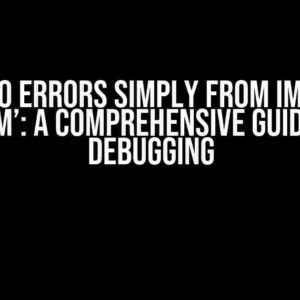C++ is an incredible programming language, offering unparalleled performance, flexibility, and complexity. However, with great power comes great responsibility, and one of the most infamous pitfalls in C++ is the ambiguous variable reference. In this comprehensive guide, we’ll delve into the world of ambiguous variable references, exploring what they are, why they occur, and most importantly, how to resolve them.
What is an Ambiguous Variable Reference?
When the C++ compiler encounters an ambiguous variable reference, it means that it cannot uniquely determine which variable or function you intend to use. This ambiguity arises when multiple variables or functions share the same name, making it challenging for the compiler to disambiguate the reference.
// Example of an ambiguous variable reference
int x = 10;
void foo() {
int x = 20; // Local variable x
std::cout << x << std::endl; // Ambiguous reference to x
}
Why Do Ambiguous Variable References Occur?
Ambiguous variable references can occur due to various reasons, including:
- Scope and Hiding: When a local variable or function is declared with the same name as a global or outer scope variable, the inner scope variable hides the outer scope one, leading to ambiguity.
- Function Overloading: When multiple functions with the same name but different parameters are declared, the compiler may struggle to determine which function to call.
- Namespace and Using Directives: When using multiple namespaces or using directives, variables and functions from different namespaces can clash, causing ambiguity.
- Typedefs and Macros: Poorly defined typedefs or macros can lead to ambiguous variable references.
Resolving Ambiguous Variable References
Don't worry; resolving ambiguous variable references is not rocket science. With these straightforward techniques, you'll be able to disambiguate even the most complex references:
1. Qualify the Variable or Function
Using the scope resolution operator (::) or the namespace resolution operator (:) can help disambiguate variable references:
// Resolving ambiguity using scope resolution operator
int x = 10;
void foo() {
int x = 20; // Local variable x
std::cout << ::x << std::endl; // Unambiguous reference to global x
}
2. Use the this Pointer
In member functions, using the this pointer can help disambiguate member variables:
class MyClass {
public:
int x;
void foo() {
int x = 20; // Local variable x
this->x = 30; // Unambiguous reference to member x
}
};
3. Rename Variables or Functions
The simplest way to avoid ambiguity is to rename variables or functions to make them unique:
int global_x = 10;
void foo() {
int local_x = 20; // Renamed local variable
std::cout << global_x << std::endl; // Unambiguous reference to global_x
}
4. Use Using Directives and Namespace Aliases
Using using directives and namespace aliases can help reduce ambiguity:
namespace my_ns {
int x = 10;
}
using my_ns::x; // Using directive
void foo() {
int x = 20; // Local variable x
std::cout << my_ns::x << std::endl; // Unambiguous reference to my_ns::x
}
5. Avoid Macros and Typedefs
Avoid using macros and typedefs that can lead to ambiguity. Instead, use const variables or enumerations:
const int MAX_VALUE = 100; // Prefer const variables over macros
enum Color { Red, Green, Blue }; // Use enumerations instead of macros
Best Practices to Avoid Ambiguous Variable References
By following these best practices, you can minimize the occurrence of ambiguous variable references:
- Use unique and descriptive variable names
- Avoid using macros and typedefs unnecessarily
- Use namespace and scope resolution operators consistently
- Keep your code organized and easy to read
- Use code review and testing to catch ambiguities early
Conclusion
Ambiguous variable references in C++ can be frustrating, but with a solid understanding of the language and some simple techniques, you can overcome these hurdles. By following the guidelines outlined in this article, you'll be well-equipped to write clear, concise, and unambiguous code that's easy to maintain and debug.
| Keyword | Description |
|---|---|
| Ambiguous Variable Reference | A situation where the C++ compiler cannot uniquely determine which variable or function to use. |
| Scope Resolution Operator | :: (colons) used to specify the scope of a variable or function. |
| Namespace Resolution Operator | :: (colons) used to specify the namespace of a variable or function. |
| this Pointer | A pointer to the current object in a member function. |
Remember, writing clear and unambiguous code is a crucial aspect of software development. By mastering the techniques outlined in this article, you'll be well on your way to becoming a proficient C++ developer.
Frequently Asked Questions
Welcome to our FAQ section, where we'll dive into the world of ambiguous variable references in C++!
What is an ambiguous variable reference in C++?
An ambiguous variable reference occurs when the compiler cannot determine which variable to use because multiple variables with the same name are in scope. This can happen when you have variables with the same name in different scopes, such as a local variable and a global variable, or when you have variables with the same name in different namespaces.
How do I resolve an ambiguous variable reference in C++?
To resolve an ambiguous variable reference, you can use a qualified name to specify which variable you want to use. For example, if you have a global variable `x` and a local variable `x`, you can use `::x` to refer to the global variable and `this->x` to refer to the local variable. You can also use a using directive or a using declaration to bring a specific variable into scope.
What are the consequences of ambiguous variable references?
Ambiguous variable references can lead to compiler errors, which can be frustrating and time-consuming to resolve. In some cases, the compiler may choose a variable that you did not intend to use, leading to unexpected behavior or runtime errors. To avoid these issues, it's essential to use unique and descriptive variable names and to carefully manage variable scope.
Can I use namespaces to avoid ambiguous variable references?
Yes, namespaces can help avoid ambiguous variable references. By placing variables in separate namespaces, you can ensure that each variable has a unique qualified name. This can be especially helpful when working with large codebases or third-party libraries. However, it's still important to use unique and descriptive variable names within each namespace to avoid ambiguity.
Are there any best practices for avoiding ambiguous variable references?
Yes, there are several best practices for avoiding ambiguous variable references. These include using unique and descriptive variable names, avoiding global variables whenever possible, using namespaces and scope resolution operators, and carefully managing variable scope and lifetime. By following these practices, you can write clearer, more maintainable code and avoid the pitfalls of ambiguous variable references.


